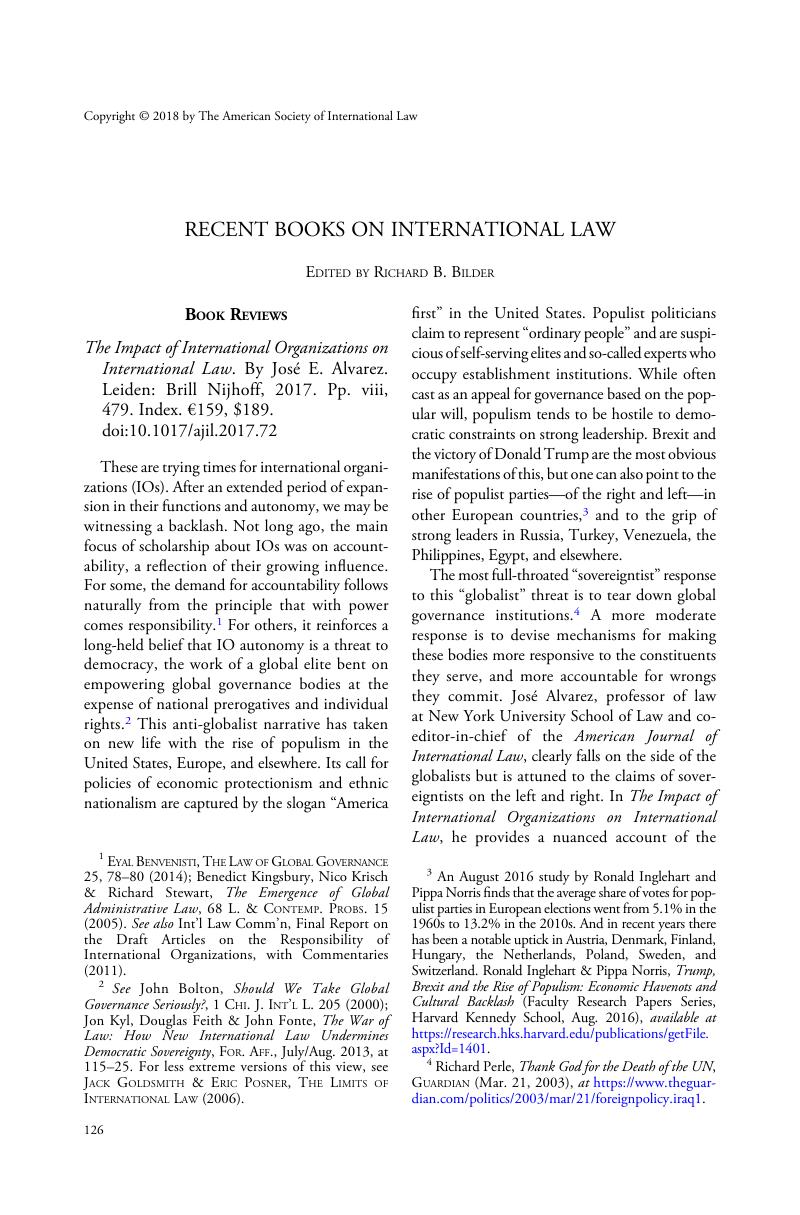No CrossRef data available.
Published online by Cambridge University Press: 16 March 2018

1 Benvenisti, Eyal, The Law of Global Governance 25, 78–80 (2014)Google Scholar; Kingsbury, Benedict, Krisch, Nico & Stewart, Richard, The Emergence of Global Administrative Law , 68 L. & Contemp. Probs. 15 (2005)Google Scholar. See also Int'l Law Comm'n, Final Report on the Draft Articles on the Responsibility of International Organizations, with Commentaries (2011).
2 See Bolton, John, Should We Take Global Governance Seriously? , 1 Chi. J. Int'l L. 205 (2000)Google Scholar; Kyl, Jon, Feith, Douglas & Fonte, John, The War of Law: How New International Law Undermines Democratic Sovereignty , For. Aff., July/Aug. 2013, at 115–25Google Scholar. For less extreme versions of this view, see Jack Goldsmith & Eric Posner, The Limits of International Law (2006).
3 An August 2016 study by Ronald Inglehart and Pippa Norris finds that the average share of votes for populist parties in European elections went from 5.1% in the 1960s to 13.2% in the 2010s. And in recent years there has been a notable uptick in Austria, Denmark, Finland, Hungary, the Netherlands, Poland, Sweden, and Switzerland. Ronald Inglehart & Pippa Norris, Trump, Brexit and the Rise of Populism: Economic Havenots and Cultural Backlash (Faculty Research Papers Series, Harvard Kennedy School, Aug. 2016), available at https://research.hks.harvard.edu/publications/getFile.aspx?Id=1401.
4 Richard Perle, Thank God for the Death of the UN, Guardian (Mar. 21, 2003), at https://www.theguardian.com/politics/2003/mar/21/foreignpolicy.iraq1.
5 S.C. Res. 2178 (Sept. 24, 2014).
6 Johnstone, Ian, Legislation and Adjudication in the UN Security Council: Bringing Down the Deliberative Deficit , 102 AJIL 275 (2008)CrossRefGoogle Scholar.
7 Alvarez, José E., International Organizations as Lawmakers, at xiii, 63, 122 (2005)Google Scholar.
8 WHO International Health Regulations, entered into force June 15, 2007, at http://www.who.int/topics/international_health_regulations/en.
9 WHO Framework Convention on Tobacco Control, May 21, 2003, 2302 UNTS 166.
10 Johnstone, Ian, Lawmaking by International Organizations: Perspectives from IL/IR Theory , in Interdisciplinary Perspectives on International Law and International Relations: The State of the Art 266, 281–82 (Dunoff, Jeffrey L. & Pollack, Mark A. eds., 2013)Google Scholar.
11 Elster, John, Deliberation and Constitution Making , in Deliberative Democracy 111 (Elster, John ed., 1998)CrossRefGoogle Scholar.
12 Ian Johnstone, The Power of Deliberation: International Law, Politics and Organizations, at ch. 2 (2011).
13 See generally Cesare Romero, Karen Alter & Chrisanthi Avgerou, The Oxford Handbook of International Adjudication (2016).
14 Case Concerning Questions of Interpretation and Application of the 1971 Montreal Convention Arising from the Aerial Incident at Lockerbie (Libya v. U.S.), Preliminary Objections, Judgment, 1998 ICJ Rep. 115 (Feb. 27).
15 Case Concerning Application of the Convention on the Prevention and Punishment of the Crime of Genocide (Bosn. & Herz. v. Serb. & Montenegro), Judgment, 2007 ICJ Rep. 43 (Feb. 26).
16 Alvarez, José E., Judging the Security Council , 90 AJIL 1, 28–38 (1996)CrossRefGoogle Scholar.
17 Case T-315/01, Kadi v. Council and Commission, 2005 ECR II-3649 (Court of First Instance); Joined Cases C-402/05 P & C-415/05 P, Kadi and Al Barakaat International Foundation v. Council and Commission, 2008 ECR I-6351 (Grand Chamber); Case T-85/09, Kadi v. Commission, 2010 ECR II-5177 (General Court); Joined Cases C-584/10 P, C-593/10 P & C-595/10, European Commission v. Kadi (Eur. Ct. Justice July 18 2013).
18 Arnull, Anthony, Judicial Dialogues in the European Union , in Philosophical Foundations of EU Law (Dickson, Julie & Eleftheriadis, Pavlos eds., 2012)Google Scholar. On dialogic judicial review in Canada, see Roach, Kent, Dialogic Judicial Review and Its Critics , 23 Sup. Ct. L. Rev. (2d) 49 (2004)Google Scholar. On the United States, see Tushnet, Mark, Dialogic Judicial Review , 61 Ark. L. Rev. 205 (2008)Google Scholar.
19 For example, he describes some of the backlash against empowered courts and “international agents” in principal-agent terms (pp. 339, 397).
20 Johnstone, Lawmaking by International Organizations, supra note 10, at 268.
21 Pollack, Mark, Delegation, Agency and Agenda-Setting in the EU , 51 Int'l Org. 99 (1997)CrossRefGoogle Scholar.
22 Alvarez refers at length to a comprehensive study undertaken by Barbara K. Woodward, Global Civil Society in International Law-Making and Global Governance: Theory and Practice (2010).
23 Johnstone, Ian, Law-Making Through the Operational Activities of International Organizations , 40 Geo. Wash. Int'l L. Rev. 87 (2008)Google Scholar.
24 Fox, Gregory, The Right to Political Participation in International Law , in Democratic Governance and International Law 48 (Fox, Gregory & Roth, Brad eds., 2000)CrossRefGoogle Scholar.
25 Cohen, Roberta, The Guiding Principles on Internal Displacement: An Innovation in International Standard Setting , 10 Glob. Governance 459, 459–65 (2004)Google Scholar. On how the practices of international organizations contribute to customary law see the work of the International Law Commission on Identification of Customary Law, at http://legal.un.org/ilc/guide/1_13.shtml
26 Kingsbury, Benedict, Donaldson, Megan & Vallejo, Rodrigo, Global Administrative Law and Deliberative Democracy , in Oxford Handbook of the Theory of International Law 526 (Orford, Ann & Hoffman, Florian eds., 2016)Google Scholar. Johnstone, Legislation and Adjudication in the UN Security Council, supra note 6, at 297–99.
27 Chayes, Abram & Chayes, Antonia Handler, The New Sovereignty: Compliance with International Regulatory Agreements 119 (1995)Google Scholar.
28 Johnstone, The Power of Deliberation, supra note 12, ch. 3.
29 Haas, Peter, Epistemic Communities and International Policy Coordination , 46 Int'l Org. 1 (1992)CrossRefGoogle Scholar.
30 Emanuel Adler & Vincent Pouliot, International Practices (2011).
31 Wenger, Etienne, Communities of Practice and Social Learning Systems , 7 Org. 225, 229 (2000)Google Scholar. See generally Etienne Wenger, Community of Practice: Learning, Meaning and Identity (1998)
32 Adler & Pouliot, supra note 30.
33 Johnstone, Ian, Treaty Interpretation: The Authority of Interpretive Communities , 12 Mich. J. Int'l L. 371(1991)Google Scholar, drawing on Stanley Fish, Is There a Text in this Class? The Authority of Interpretive Communities (1980).
34 See Anthea Roberts, Is International Law International? (2017) on the notion of “comparative international law,” which considers how international lawyers from different states, regions, and geopolitical groupings understand and approach international law.